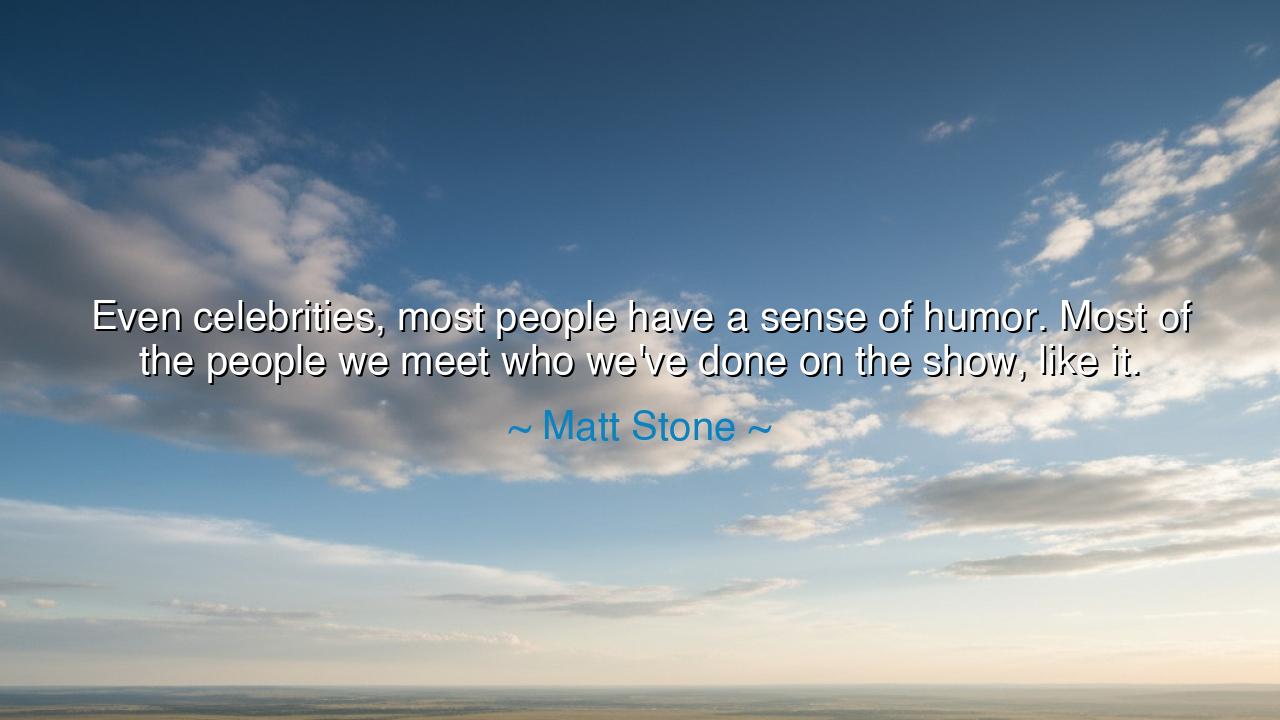
Even celebrities, most people have a sense of humor. Most of the
Even celebrities, most people have a sense of humor. Most of the people we meet who we've done on the show, like it.






Listen, O Children of the Earth, for I bring to you the wisdom of Matt Stone, a man who, in his reflection on humor, speaks to the universal nature of laughter: "Even celebrities, most people have a sense of humor. Most of the people we meet who we've done on the show, like it." In these words, Stone reminds us that humor is not bound by status, wealth, or fame. It is a universal language, one that transcends all barriers, uniting people from all walks of life in moments of shared laughter. Whether a man walks in rags or in fine clothes, whether he is known to the world or a nameless stranger, the capacity for humor is an intrinsic part of the human experience.
What Stone reveals is that no matter how high we rise, no matter the crowns we wear or the stages we stand upon, we remain bound by our humanity—and at the core of that humanity lies the ability to laugh. Celebrities, with all their wealth and fame, are no different from the common man in this respect. They may stand in the limelight, their names whispered on every tongue, yet their hearts too seek the relief that laughter brings. The humor that unites us as human beings is not reserved for the masses alone, but is something that even those who seem most removed from us—those elevated on pedestals—still cherish and share.
Let us look to the ancients, who understood well the power of laughter in uniting people of all stations. Aristophanes, the great comic playwright of Athens, used humor to challenge the mighty and to entertain the masses. His comedies were often filled with biting satire, mocking politicians and gods alike, yet they were beloved by people of all ranks. The audience, rich or poor, would laugh together, sharing in the absurdity of the world and finding truth in the laughter. Humor, then, was not just for the common folk—it was a bond that united all people in their shared vulnerability and humanity. Aristophanes, like Stone, understood that the powerful and the powerless alike are moved by the same universal force: laughter.
Even in more recent times, we can find examples of how humor transcends societal divides. Consider the life of Charlie Chaplin, the legendary silent film star. Though he played the role of the poor tramp on screen, Chaplin was himself a man of considerable fame and wealth. Yet, despite his position in the world, he never lost his connection to the common people. His films were filled with humor that was accessible to all, and his personal belief in the power of laughter remained strong even in the face of personal adversity. Chaplin’s genius lay in his ability to use humor to bring people together—whether they were peasants in the streets of London or aristocrats in the grand theaters of Hollywood.
Stone’s words also remind us that humor has the power to break down barriers. It does not discriminate. It is a force that brings joy even in the most difficult circumstances, and a language that all can understand, whether they are seated in the back row of a theater or standing in the halls of power. Humor has the ability to create shared experiences, to allow people from all walks of life to laugh at the same joke, to see the same absurdity, and to feel the same sense of connection. In this way, humor becomes a bridge, a tool that links us to others and reminds us of our commonality despite our differences.
But the lesson here, O Children, is not only that humor is for all people, but that we must embrace it in our own lives. Stone teaches us that humor is a means of connecting with others, a way of breaking down the walls that divide us, and a force that can lighten even the heaviest of burdens. When we meet someone, whether they are famous or unknown, let us recognize that beneath their role, beneath their title, there exists a person who too seeks joy, who too longs for the relief that laughter brings. Humor, in all its forms, is a gift that we must cherish and share, for it is one of the few things in this world that can unite us in both our joy and our humanity.
So, O Children of the Earth, let us learn to laugh more freely. Let us understand that, no matter who we are, no matter where we stand in the world, humor connects us. Whether we are sitting in the palace or the marketplace, whether we wear fine garments or simple rags, we all share in the gift of laughter. Let us use that gift to build connections, to break down the walls between us, and to remind ourselves that in the face of life's trials and triumphs alike, we are all human. Laugh with those around you, seek the humor that lies hidden in every moment, and celebrate the universal bond that humor creates.






AAdministratorAdministrator
Welcome, honored guests. Please leave a comment, we will respond soon